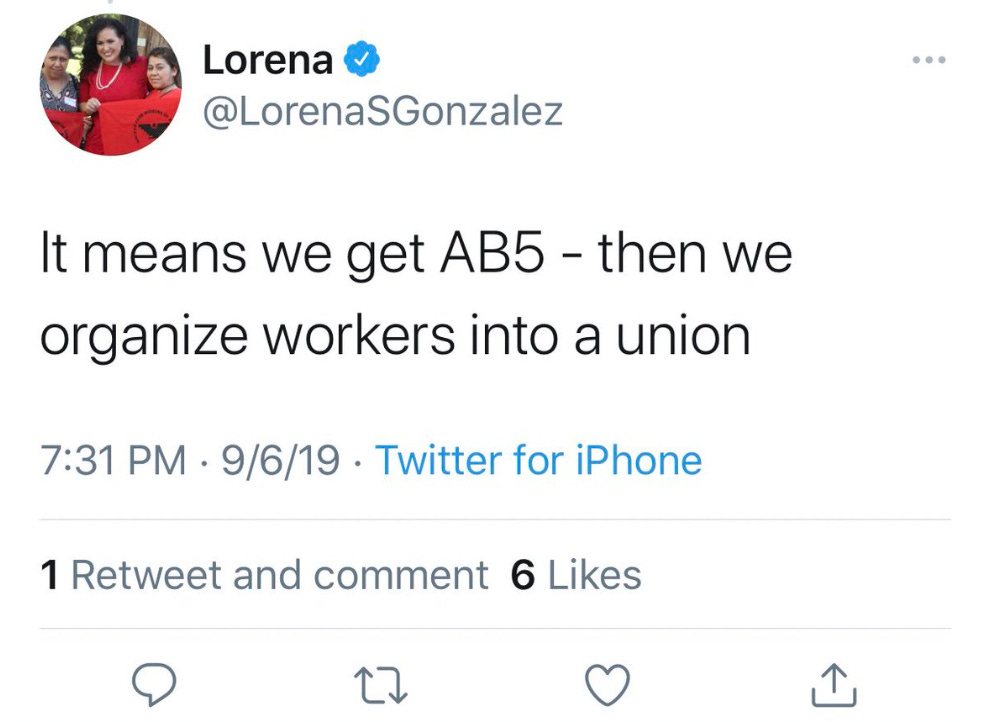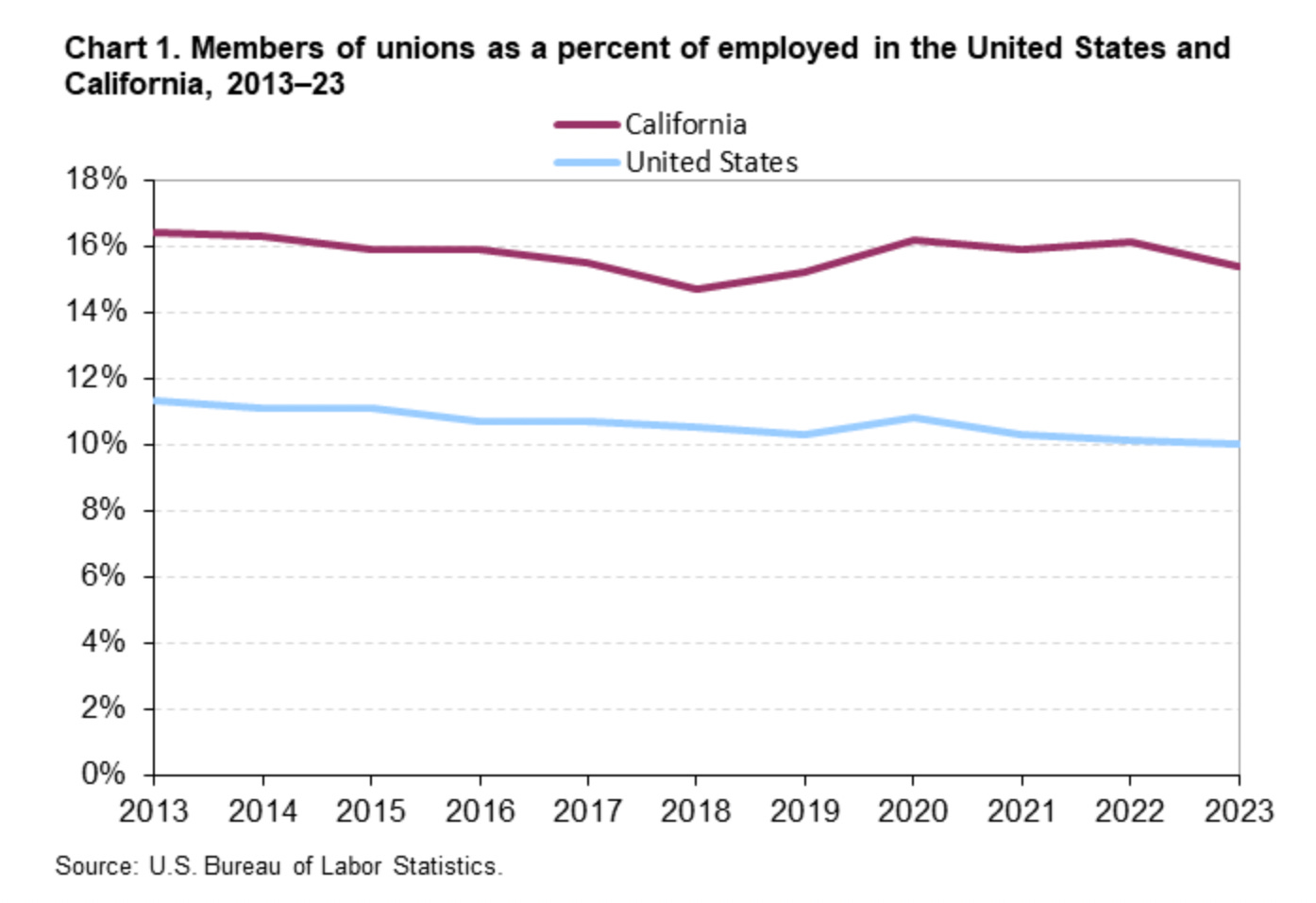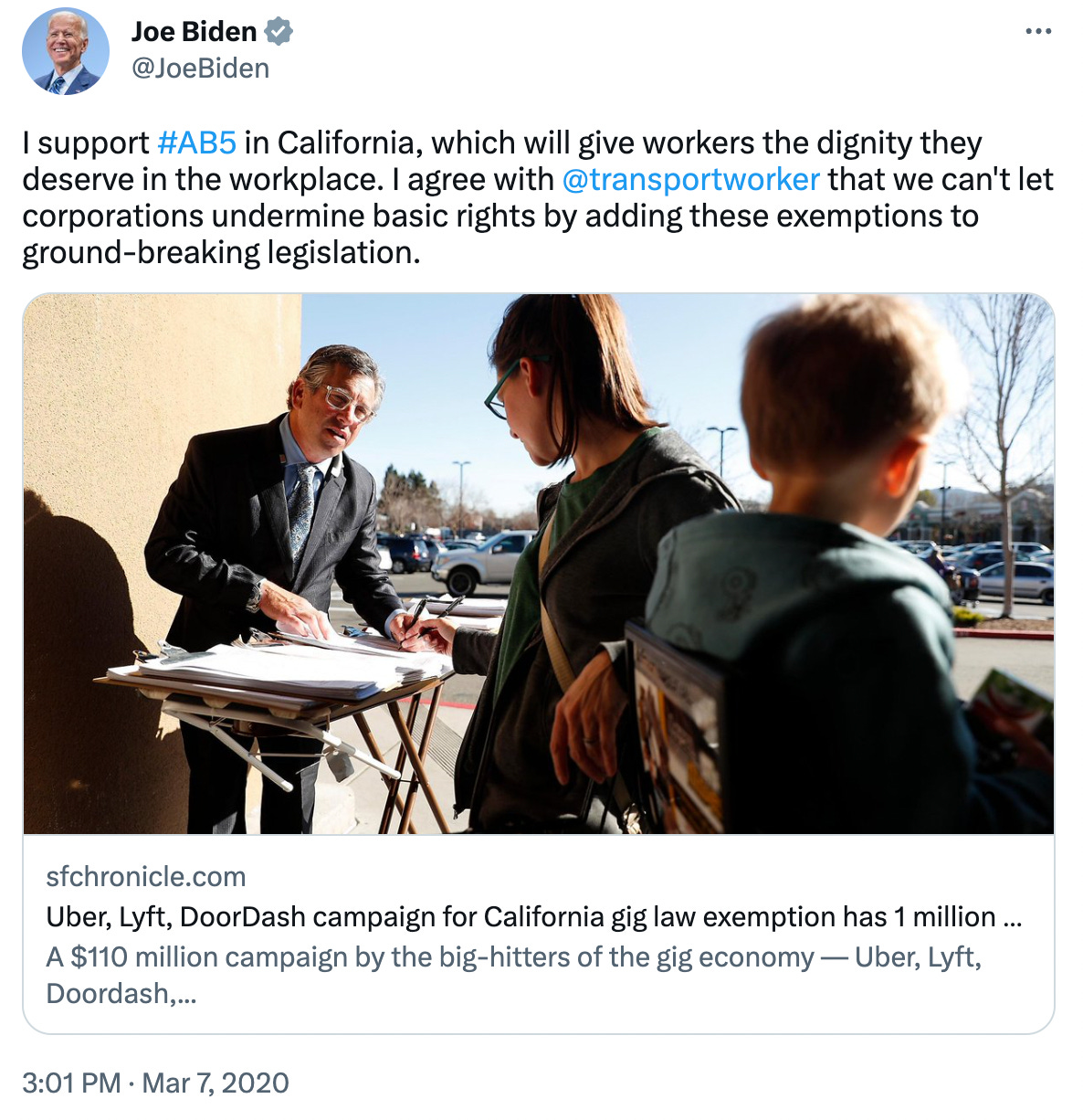Would Harris Be Better than Biden for Independent Contractors?
Short answer: no. Using the ABC Test to achieve nationwide freelance busting is now written into the Democratic Party platform.
The right to choose self-employment should not be a partisan issue. Every American has enjoyed this right—to hang out a shingle and go into business for ourselves—since the day the United States was founded.
Democrats, Republicans and Independents alike are among America’s tens of millions of independent contractors. None of us want our business relationships to be restricted or outlawed. All of us are just trying to pay the ever-rising grocery bills.
As the Democratic Party continues to discuss whether to replace President Biden with Vice President Harris at the top of the ticket, it’s more than reasonable for all of us to ask where Harris stands on freelance busting. (Just as it’s reasonable to question the presumptive Republican Party nominee, former President Donald Trump.)
If the Democratic Party ultimately asks voters to advance Harris’ career, we need to know whether she would support policies to destroy our careers.
The Record Is Long and Clear
It is undeniable that Biden and Harris, together, have led the most aggressive freelance-busting administration in American history.
They often describe themselves as leading the most pro-union administration ever to be in the White House. Unionists agree that’s true. It’s also true that that those same unionists are the ones driving the push for freelance-busting policies nationwide.
Union organizers want self-employment laws and regulations to change because right now, the law protects independent contractors from them. Freelance busting encompasses a variety of efforts to let unions organize Americans who have traditionally been our own bosses.
The Biden-Harris administration, elected with strong union support, has taken initial freelance-busting efforts by the Obama-Biden administration and jacked them up on a level of steroids usually reserved for stunning an entire herd of wild buffalo.
Here is the record for your own assessment.
The Obama-Biden administration tapped David Weil—an academic who has long wanted to see independent contractors reclassified as unionizable employees—to serve in a key role at the U.S. Department of Labor. Weil made a notable bureaucratic move in 2015 to try and limit the choice of self-employment. Labor and employment attorneys at the time called what was happening unprecedented.
Then, from January 2017 to January 2021, we had the Trump administration. Much to the chagrin of unionists, that administration made it impossible for the freelance-busting crowd to advance their preferred policies through Congress or the White House. President Trump threatened to veto a bill called the PRO Act, and moved to protect independent contractors from inside the federal Department of Labor.
That’s also the same time period, 2018-20, when the freelance-busting brigade moved aggressively to try and advance policies in states where the Democratic Party had trifecta control. The AFL-CIO targeted my home state of New Jersey (which is how I became aware of this policy threat to independent contractors), and by far, the biggest freelance-busting move was in California, with a law known as Assembly Bill 5.
California’s legislature passed AB5 and Governor Gavin Newsom signed it into law in 2019. It went into effect in January 2020. What made this law so harmful to independent contractors is that it includes a strict version of regulatory language called the ABC Test that even legitimate independent contractors cannot pass.
Among other things, this ABC Test regulatory language essentially makes it illegal to be self-employed if you perform work in the same line of business as your clients. This ABC Test means that without an exemption from the law, even longtime freelance translators can no longer do work for translation companies, freelance writers can’t sell articles to publishers, freelance musicians can’t perform at music festivals—the list stretches into more than 600 affected professions.
Without an exemption, the only way for a self-employed person to continue earning money through existing business relationships is to become a unionizable employee of one or more clients. A theoretical scenario for a solopreneur with, say, 25 occasional clients is that she now has 25 part-time jobs, each one with its own separate boss that she must report to as an employee.
Most people intuitively understand that having 25 part-time bosses is worse than being your own boss. Still, that reclassification as an employee is what the freelance-busting brigade wants, because employee status is required for unionization.
Here’s how Teamster-turned-Assemblywoman Lorena Gonzalez, who sponsored AB5, described the intent of California’s law:
California’s AB5 law proved disastrous not only for independent contractors, but also for overall employment. Earlier this year, researchers documented that for affected occupations, self-employment decreased by 10.5% while overall employment decreased by 4.4%.
AB5 also did nothing long-term to improve union-membership rates the way its promoters had hoped it would:
Biden and Harris were both seeking the Democratic Party presidential nomination when AB5 was in play in California, a fact that helps us understand their individual thinking on this policy issue.
They both actively supported it.
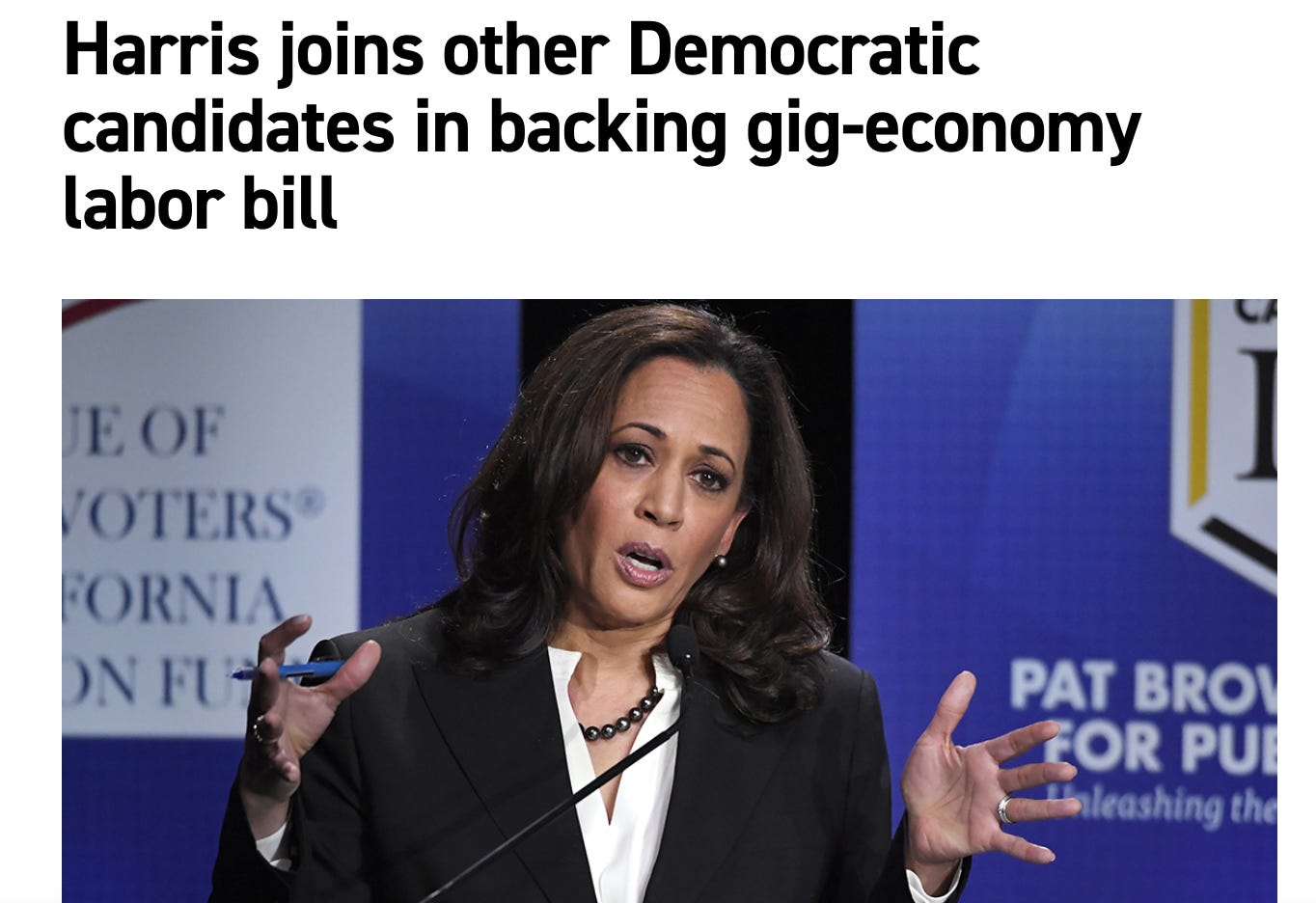
Harris’ spokesman told Politico at the time that she supported AB5 for this reason:
“She believes we need to go even further to bolster worker protections and benefits and elevate the voice of workers. In our evolving economy, she believes it’s critical we ensure a robust social safety net for all workers and support their right to join a union.”
Biden, with Harris as his No. 2, was sworn into office on January 20, 2021. One of his first acts from the Oval Office that same day was to fire the general counsel of the National Labor Relations Board and start moving to install a union lawyer in the job. She, in turn, changed the NLRB’s policy on independent contractors. Labor and employment attorneys noted:
“The practical result of this decision is that many more workers are likely to be classified as employees, and therefore be permitted to join unions.”
Meanwhile, to run the Department of Labor, the Biden-Harris administration installed Marty Walsh, whom Biden called “one tough union chief.” As the No. 2 in that department, the Biden-Administration tapped the top enforcer of California’s Assembly Bill 5, Julie Su. She has since become Acting Labor Secretary following Walsh’s departure. That agency, too, changed its policy on independent contractors (and is now facing multiple lawsuits, including this one in which I am a plaintiff).
President Biden also, via executive order, created a pro-union task force and named Vice President Harris as its chairwoman.
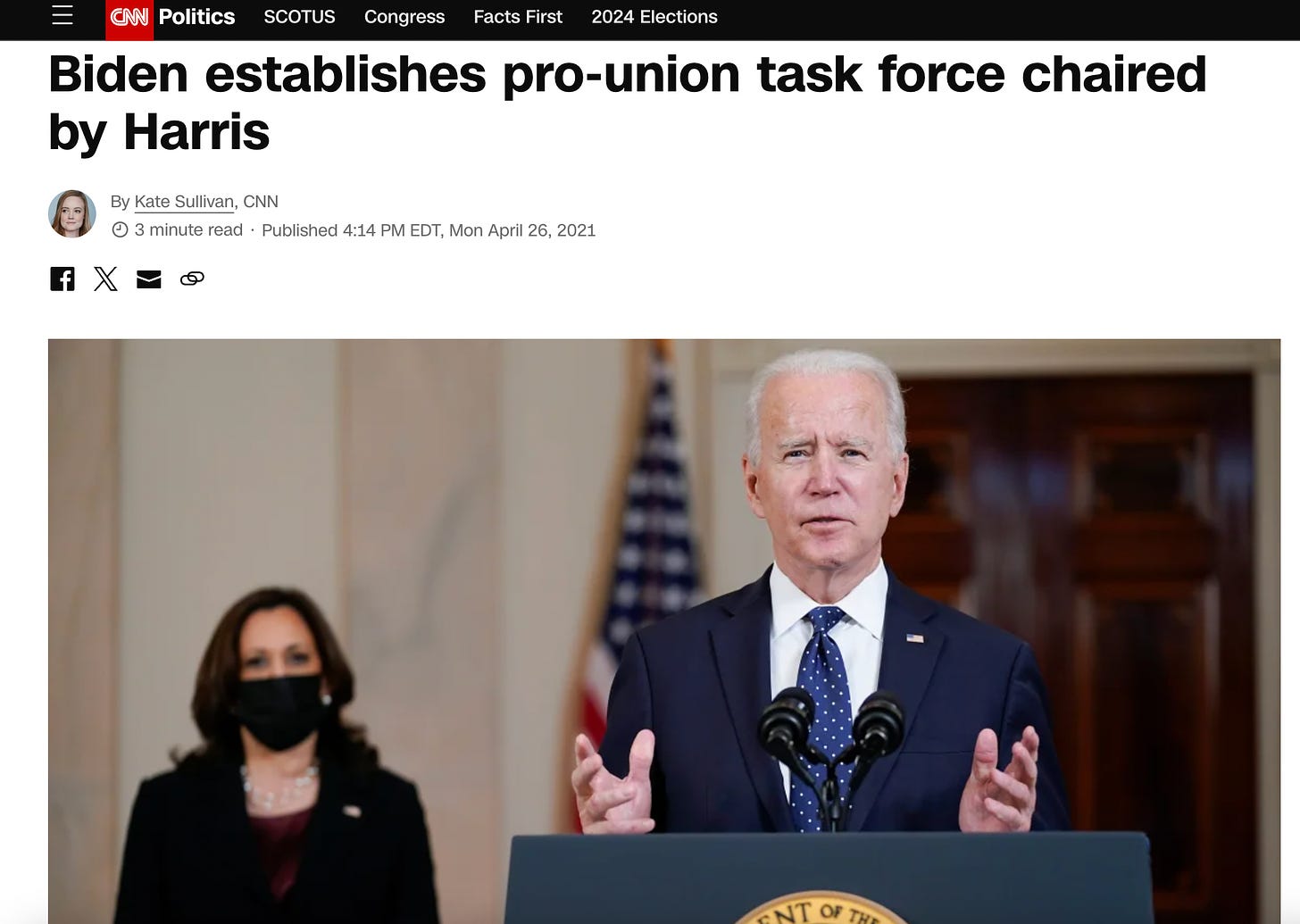
That task force issued a 46-page report to the president in 2022. It states that President Biden and Vice President Harris strongly support the PRO Act. It also encourages the president to have other agencies—including the Internal Revenue Service and Department of Transportation—continue to crack down companies that work with independent contractors when that work can be defined as misclassification to undermine union organizing.
Biden and Harris, to this day, are calling on Congress to pass the PRO Act—which still includes the same freelance-busting language as California’s AB5. Despite all the evidence showing that the primary effect of such policymaking is to harm legitimate independent contractors, both Biden and Harris firmly support it.
Biden included the call to pass the PRO Act in his most recent State of the Union Address. Harris said the same thing less than a month ago in a speech to the SEIU, a union that plans to spend $200 million trying to elect Democrats this fall.
The Democratic Party Platform
Whoever ends up being the Democratic Party’s presidential candidate this year, that person will be the standard-bearer for the party’s stated platform.
Hardcore freelance busting—imposing the ABC Test from California’s law on the whole country—is now written right into that platform:
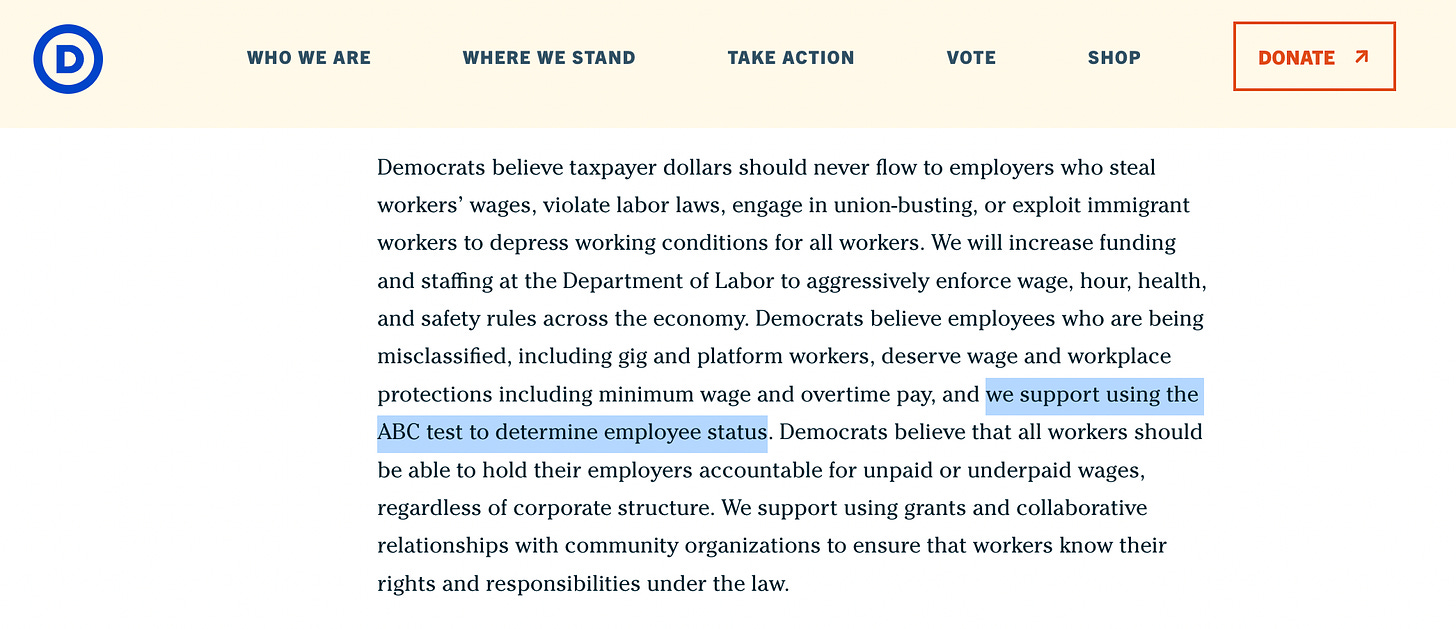
Precious few Americans support this idea of restricting or outlawing self-employment. Researchers for almost a decade now have asked all kinds of independent contractors about this. In 2015, government researchers found that “more than 85 percent of independent contractors and the self-employed appeared content with their employment type.”
Since then, government and private researchers have found more and more of the same. They have asked app-based gig drivers, insurance and financial advisers, data scientists, computer programmers, writers, photographers, graphic designers and healthcare workers. Researchers have asked mothers, renters, single people and people of color. They have asked former independent contractors. They have asked Americans doing side hustles to make a few extra bucks. They have asked people who earn all their income as independent contractors.
Again and again, the results are the same. Most of us are happy. Most of us do not wish to become employees.
Supporters of Vice President Harris who are promoting her to become the Democratic Party’s nominee cite a recent poll showing that about 45% of Americans would definitely or probably trust her on the issue of jobs.
It’s imperative for the tens of millions of Americans who earn some or all of their income as independent contractors to understand where she stands when it comes to money that is earned through self-employment.
The record shows that Harris poses a real threat to independent contractors’ income, and for many of us, to our entire careers.




